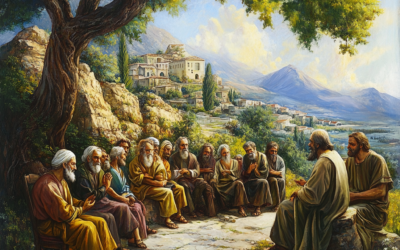To me, having a blueprint for just about everything provided to us in the bible is pretty great. I also think that love is probably one of the most important lessons in the bible – so this might be an article that I update quite a bit. Grab your floaties, because God’s love isn’t some fluffy, feel-good sentiment. I believe He is telling us that we must life this way, it’s not a light hearted suggestion.
When we talk about God’s love, we aren’t describing the kind of love you see on a Hallmark card—soft and easy. This is love with calloused hands and a bleeding heart. It’s gritty. It’s costly. It’s not about convenience; it’s about sacrifice.
“For God so loved the world, that He gave His only Son, so that everyone who believes in Him will not perish, but have eternal life.”
John 3:16 (NASB)
This verse isn’t just the Christian world’s favorite T-shirt slogan. It’s a battlefield declaration. God’s love for humanity didn’t stop at warm feelings or vague goodwill. He acted. He gave—a word that implies not just generosity but the kind of giving that hurts. He handed over His Son, knowing full well it meant betrayal, humiliation, torture, and death.
Contextual Snapshot: What Was at Stake?
At the time Jesus made this statement, the world wasn’t exactly winning any humanitarian awards. People weren’t sitting around singing hymns of praise. Humanity was broken, selfish, and entirely unworthy of this gesture. Yet, God didn’t wait for us to clean up our act. His love came crashing into our mess.
The Greek word for “love” here is agape. It’s a selfless, unconditional love. No strings. No clauses. It’s love that gives everything and expects nothing in return.
“But God, being rich in mercy, because of His great love with which He loved us, even when we were dead in our wrongdoings, made us alive together with Christ.”
Ephesians 2:4-5 (NASB)
“The world” means all of it. Not just the polite, churched folks. God’s love extends to the liars, the addicts, the rebels, and even the self-righteous. It’s annoyingly inclusive.
To frame this with some historical flair:
Historian Edward Gibbon gives us an interesting image of Roman society during Jesus’ time. The Empire was “polished but corrupt,” as he said, a place where ambition and almost inhuman rule from the top were the order of the day. Public executions were a spectacle, enjoyed by many publicly, slavery was probably about as common as any other time in history, and abandoning children to die was just another day at the quarry. A real highlight reel of humanity.
Meanwhile, historian N.T. Wright offers insight into the Jewish mindset of the era. After centuries under foreign rule, there was a desperate hope for a political Messiah—a leader who would shatter the yoke of Roman oppression. But along comes Jesus, flipping tables and expectations, preaching forgiveness and compassion instead of rebellion. That wasn’t exactly the insurrection they had in mind.
Agape in the First Century
Theologian William Barclay points out that the early Christian idea of agape (We have a writeup on all of the types of love in the bible)—a love that gives without expecting anything in return—was about as common as seeing a Marvel movie in the Coliseum. The Romans were all about “me first,” making selfless, unconditional love feel like an act of rebellion in itself. Agape wasn’t just rare; it was revolutionary, a love that couldn’t be bought or bargained for.
C.S. Lewis described this kind of divine love as “gift-love,” the kind that doesn’t play favorites. It’s a love that embraces even the worst of us. Paul’s words in Ephesians 2:4-5 hammer this home: while we were “dead in our wrongdoings,” God’s love showed up, breathing life into our wreckage. No waiting for us to get our act together—just love that transforms brokenness into life.
Love Proven in Action
“But God demonstrates His own love toward us, in that while we were still sinners, Christ died for us.”
Romans 5:8 (NASB)
Notice the verb: “demonstrates.” Love isn’t love unless it does something. God didn’t just sit on a cloud and whisper sweet nothings. He got His hands dirty. While we were still shaking our fists at Him, He stepped in and laid His life down. This wasn’t a last-minute decision or a reaction to our goodness. It was the plan all along.
“Greater love has no one than this, that a person will lay down his life for his friends.”
John 15:13 (NASB)
Here’s a closer look from other perspectives on these two great passages:
Romans 5:8 – God’s Love in Action
- John Stott (Anglican Theologian): Stott argued that Romans 5:8 reveals the “logic of God’s love.” This love isn’t based on merit or performance—it’s freely given, even to those who reject Him. Stott considered this a sharp contrast to human love, which so often depends on the perceived value of the other person.
- Matthew Henry (Puritan Commentator): Henry described this verse as the “highest demonstration of divine love.” He emphasized that God didn’t wait for humanity to get its act together; Christ sacrificed Himself while we were still His enemies.
- N.T. Wright (Contemporary Scholar): Wright linked Romans 5:8 to the grander theme of God’s covenant faithfulness. He highlighted that God’s love is proactive, self-sacrificial, and transformational—laying the foundation for reconciliation and renewal.
John 15:13 – The Ultimate Sacrifice
- C.S. Lewis (Christian Apologist): While Lewis didn’t comment directly on this verse, his insights in The Four Loves align closely. He wrote that the greatest love, agape, is a selfless love that prioritizes others’ well-being, even at great personal cost.
- D.A. Carson (Evangelical Theologian): Carson noted that Jesus sets the benchmark for love in John 15:13. This isn’t about abstract feelings but a tangible, costly act. He tied this love to the cross, where Jesus died not only for His friends but extended that friendship to sinners.
Theological Bombshell: Unconditional Love
This is the part where we struggle. God’s love is not performance driven. It is unaffected by our morals, piety, or the absence of Sunday morning parking lot meltdowns. It’s fully based on His character, not ours.
“While we were still sinners”: I don’t see any fine print here. God didn’t wait for us to apologize or prove we were worthy. He loved us at our worst.
“Christ died for us”: This isn’t abstract. He didn’t just send a text or write a check. He died. For you. For me. For the people we secretly (or not-so-secretly) can’t stand.
“We love, because He first loved us.”
1 John 4:19 (NASB)
The Scandal of It All
Here’s the kicker: God’s love is offensive. It offends our pride, because we can’t earn it. It offends our sense of justice, because it’s too generous. And it offends our tribalism, because it’s for everyone.
A Few Theological Perspectives:
*These should be taken with a grain of salt – they are not catch-all and are just here as examples.
- Traditional View (Catholic & Orthodox): God’s love is the foundation of His redemptive work. The sacrificial death of Christ is seen as the ultimate act of love, satisfying divine justice while extending mercy.
- Protestant Perspective (Evangelical): The emphasis is often on the substitutionary atonement—Christ took our place out of love, absorbing the punishment we deserved.
- Modern Theological Views: Some stress God’s solidarity with human suffering. In Christ’s death, God enters our pain, showing love by identifying with the brokenness of the world.
What Does This Mean for Us?
Here’s where the rubber meets the road. When I reflect on this personally, I have to ask myself what in the world can I do with all of this love?
- We receive it. Stop trying to work for it. You can’t. Just sit there and let the sheer absurdity of it wash over you. Let it undo you in all the right ways.
- We reflect it. God’s love is both the blueprint and the command. “We love because He first loved us” (1 John 4:19, NASB). It’s not just about loving the easy people—it’s about loving the difficult ones, forgiving the impossible, and giving beyond reason.
- We rest in it. Life is chaotic, and people can drain the life out of you. But God’s love? It doesn’t flinch, even when you’re falling apart at the seams. You don’t need to grind for His favor. It’s already yours.
Final Thought: The Endless Well
God’s love is like an ocean we can’t see the end of. It’s overwhelming, irrational, and relentless. And the best part? It’s for you. Whether you’re riding high or barely hanging on, His love doesn’t change. It never will.
“For I am convinced that neither death, nor life, nor angels, nor principalities, nor things present, nor things to come, nor powers, nor height, nor depth, nor any other created thing will be able to separate us from the love of God that is in Christ Jesus our Lord.”
Romans 8:38-39 (NASB)
So, the next time you feel unworthy, remember: God didn’t ask your permission to love you. He just did. And that changes everything.
Want some additional Resources?
Websites
- GotQuestions.org
It’s a go-to website for many people who find inspiration and healing – I prefer the good ‘ol bible though but that’s just me.
https://www.gotquestions.org - BibleGateway.com
You can use this to explore many different translations along with some commentary for specific scripture.
https://www.biblegateway.com - Desiring God
Articles and sermons on God’s love and eternal life, inspired by scripture.
https://www.desiringgod.org
Books
- “The Case for Christ” by Lee Strobel
A journalist’s investigation into the claims of Christianity and the meaning of Christ’s sacrifice. - “Knowing God” by J.I. Packer
Trying to really understand who God is – It’s Packer’s best-selling book (We’ll have to give him a pass though because he’s Canadian 😉 - “Mere Christianity” by C.S. Lewis
A real classic by one of the masters. It takes us through some interesting thoughts on why God’s love is so important to our humanity.
Scripture quotations taken from the (NASB®) New American Standard Bible®, Copyright ©, 2020 by The Lockman Foundation. Used by permission. All rights reserved. lockman.org









0 Comments